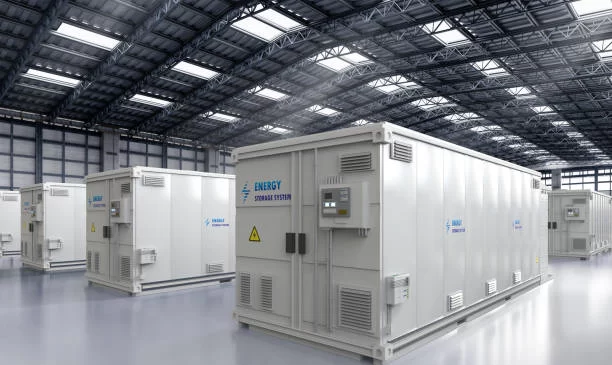Maximizing Efficiency: The Role of Battery Energy Storage Systems in Modern Grids
In the era of energy transition, Battery Energy Storage Systems (BESS) are gradually becoming an indispensable part of modern grids, playing a critical role in improving grid efficiency and reliability.

1. The Working Principles and Types of Battery Energy Storage Systems
The core of a BESS is battery technology, which stores electrical energy through chemical reactions and releases it when needed. Common battery types include lithium-ion batteries, lead-acid batteries, and flow batteries.
Lithium-ion batteries have high energy density, long cycle life, and fast charging and discharging capabilities, making them suitable for applications with high energy and power requirements. Lead-acid batteries are relatively low-cost but have limited energy density and cycle life. Flow batteries excel in large-scale energy storage, with flexible storage capacity adjustments.
2. Key Roles in Modern Grids
- Balancing Supply and Demand
Maintaining the balance of power supply and demand is crucial for stable grid operation. Renewable energy sources like solar and wind power have intermittent and uncertain generation patterns, but BESS can store excess energy during peak generation periods and release it during high demand or when renewable generation is insufficient, effectively balancing supply and demand and reducing grid fluctuations.
For example, during sunny days, solar power plants generate more electricity than needed. BESS can store this excess energy and release it during nighttime or cloudy days when solar generation decreases, meeting the demand.
Enhancing Grid Reliability
Grids may face sudden failures, natural disasters, or sudden increases in power demand. BESS can act as emergency power sources, quickly responding and providing power support to critical facilities and users, ensuring grid reliability and stability.
In the event of a grid failure causing a blackout, BESS can start up within milliseconds to provide uninterrupted power supply to important facilities like hospitals, communication stations, and traffic lights, ensuring normal social operations.
Improving Power Quality
Power quality includes aspects such as voltage stability, frequency stability, and waveform purity. Battery Energy Storage Systems can quickly charge and discharge to compensate for voltage fluctuations, frequency deviations, and harmonics in the grid, improving power quality and protecting sensitive equipment from power disturbances.
For instance, when a sudden high-power load connection causes a voltage drop in the grid, BESS can quickly discharge to supplement the missing power, maintaining voltage stability.
Facilitating Renewable Energy Integration
As the proportion of renewable energy in the grid increases, its intermittency and variability pose significant challenges. Battery Energy Storage Systems can smooth out the output of renewable energy, making it easier to integrate with the grid, accelerating the large-scale adoption and application of renewable energy.
By buffering and regulating short-term fluctuations in renewable energy generation, BESS can make the output of renewable energy more stable and predictable, increasing the grid’s capacity to accept renewable energy.
Reducing Grid Operating Costs
By optimizing the storage and release of electricity, BESS can help grids reduce reliance on expensive peaking power plants and lower transmission and distribution losses, thus reducing overall grid operating costs.
Storing energy during low-demand periods and releasing it during peak periods can avoid the need to start high-cost generation facilities during peak times, reduce grid congestion and losses, and achieve economic benefits.

3. Challenges and Solutions
- Cost
- Lifespan and Performance Degradation
- Safety Concerns
- Policies and Market Mechanisms
Despite the decreasing cost of BESS, initial investment remains high. Solutions include technological innovation to lower battery costs, extend battery life, and reduce system integration costs through economies of scale.
Batteries experience performance degradation and shorter lifespans after multiple charge and discharge cycles. Optimizing battery management systems, adopting advanced control strategies, and thermal management technologies can extend battery life and maintain stable performance.
Battery Energy Storage Systems involves large battery arrays, posing risks such as fires and short circuits. Enhancing battery safety design, installing fire and explosion prevention facilities, and establishing comprehensive monitoring and warning systems are key to ensuring safety.
Comprehensive policies and market mechanisms are crucial for the development of BESS. Formulating reasonable electricity pricing policies, storage subsidies, and establishing sound electricity market rules can provide a favorable environment for BESS investment and operation.
4. Future Outlook
With continuous technological advancements and further cost reductions, BESS will play an increasingly important role in modern grids. In the future, we can expect to see battery technologies with higher energy densities, longer lifespans, and lower costs. Additionally, BESS will integrate deeply with smart grid technologies, achieving more efficient, flexible, and intelligent power management.
Against the backdrop of global energy transition, BESS will be a crucial support for building a clean, reliable, and efficient energy system, contributing significantly to achieving sustainable development goals.
In conclusion, BESS holds immense potential for maximizing efficiency, providing robust support for the stable operation of modern grids, integrating renewable energy, and facilitating energy transition. By continuously overcoming challenges and driving innovation, BESS will lead us toward a more intelligent and green energy future.
